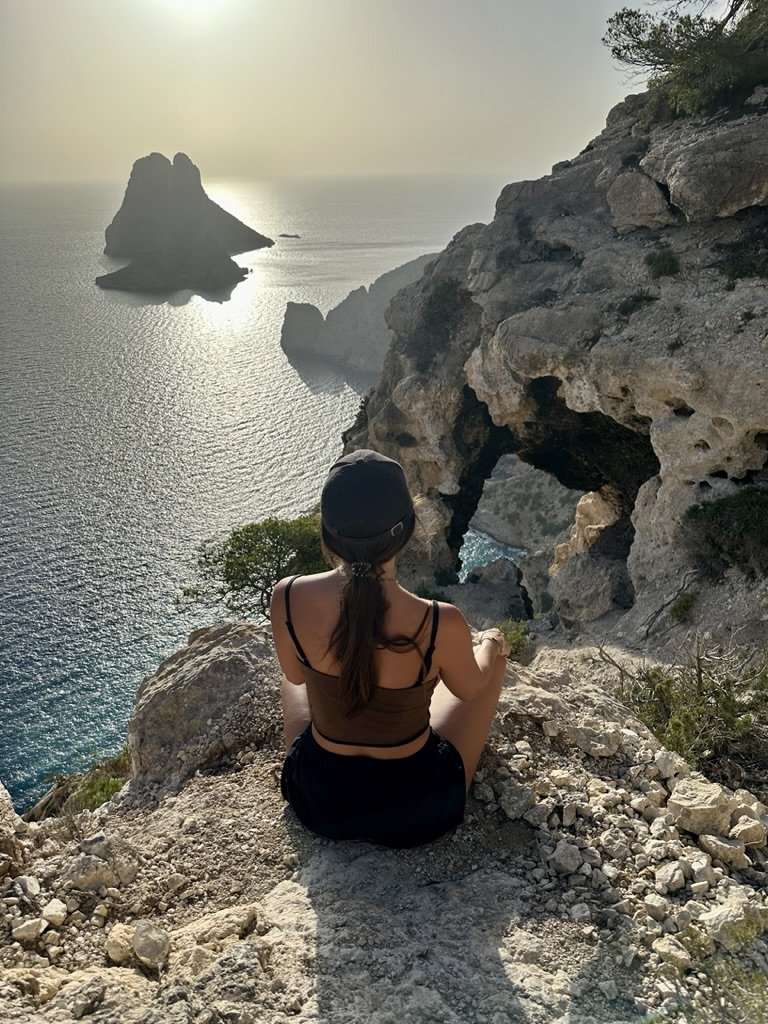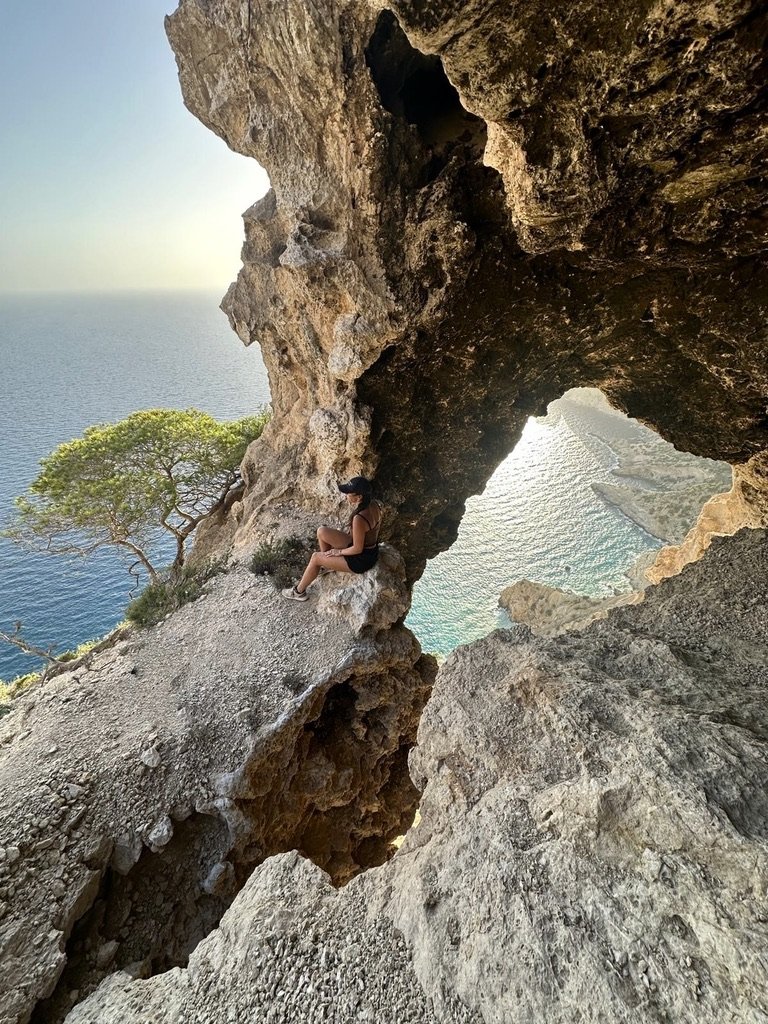The Science of “Awe”
& the magical nature reserve, Es Vedrà
Awe is a profound emotional response that occurs when we encounter something vast or beyond our ordinary understanding. Research shows that awe can be triggered by various experiences, such as observing natural wonders, listening to music, or seeing expansive images of outer space. These experiences help shift our focus from ourselves to something larger, often evoking other self-transcendent emotions like gratitude & compassion. For example, in a study where participants viewed scenes from space through virtual reality, many reported feeling deeply moved & connected to the universe, reinforcing awe's role in enhancing feelings of selflessness & connection.
Beyond its emotional impact, awe has significant social & physiological benefits. Studies reveal that awe fosters prosocial behaviors, making people more generous, cooperative, & empathetic. For instance, participants who experienced awe by looking at towering trees were more likely to help others afterward. On a physiological level, awe may even support health by reducing levels of pro-inflammatory cytokines, which are associated with chronic illness. These findings suggest that awe, whether experienced through nature, art, or meaningful social interactions, plays a crucial role in promoting both individual well-being & social harmony.
When was the last time you’ve felt a sense of awe or wonder?
Did that experience help you gain any perspective or aid in your well-being?
I recently had the opportunity to take a hike & experience the magical & legendary limestone rock of Es Vedrà nestled off the southwestern coast of Ibiza. Many visitors go to marvel at this beguiling landmark when they come here & it's not difficult to see why. When you get your first proper glimpse of this big, imposing rock, you feel awe & wonder that truly lifts your spirits & takes your breath away -a profound emotional response that comes from encountering something vast, beautiful, or incomprehensible. Psychologically, awe is an emotion that triggers a cascade of cognitive & behavioral changes. It makes us feel small in the presence of something greater than ourselves, yet simultaneously connected to it. Research suggests that awe can lead to a reduction of ego, increased feelings of interconnectedness, & a greater willingness to engage in prosocial behaviors.
The island, which is part of a protected nature reserve, is uninhabited by humans & yet feels alive with myths, magnetic forces, & an undeniable sense of enchantment. But what is it about Es Vedrà that has drawn people to it for centuries? How does its mystical aura tap into the deep psychology of belief, awe, and our need for connection to the natural world?
When visitors experience awe while gazing at Es Vedrà, they are likely tapping into one of the most powerful aspects of human psychology: the need to feel part of something larger than themselves. Awe has been linked to improved well-being, increased curiosity, & even greater creativity. The rock’s imposing height, stark beauty, & enigmatic history combine to create the perfect environment for such an emotional response.
Es Vedrà's natural allure acts almost as a psychological anchor, grounding its visitors in the present moment while expanding their minds to contemplate the greater mysteries of life. In the presence of such majestic landscapes, people often report feeling a heightened sense of spirituality or a desire to connect with deeper truths—an effect that is heightened by the mystical lore surrounding the area.
Mystical origins
Es Vedrà has been shrouded in myth for generations. Local folklore speaks of ancient goddesses, sirens, & even UFO sightings. It is said to be one of the most magnetic places on Earth, a claim that has fascinated adventurers, spiritual seekers, & scientists alike. According to legend, Es Vedrà was once the home of the Phoenician goddess Tanit, who was revered as the protector of Ibiza & fertility. Others believe it to be the tip of the sunken civilization of Atlantis, or the island of the sirens that tried to lure Odysseus in Homer’s "The Odyssey."
These legends are not just fanciful stories; they are deeply ingrained in the cultural memory of the region & speak to a universal human desire: to connect the unknown with the extraordinary. Mythical tales about Es Vedrà feed into our psychological tendency to seek patterns & meaning in the natural world—a phenomenon known as apophenia. When we encounter something as breathtaking & inexplicable as Es Vedrà, our brains naturally weave stories to help us make sense of what cannot easily be explained.
Nature as Therapy
Es Vedrà is not just a visual spectacle or a hotspot for mythology—it is also part of a protected nature reserve, which adds a layer of environmental significance. The island’s biodiversity & untouched landscapes offer a sanctuary for those looking to escape the noise of modern life. More than ever, we are recognizing the importance of ecotherapy—the psychological and physiological benefits of being in nature. Spending time in natural settings like Es Vedrà has been shown to reduce stress, lower blood pressure, & improve mood.
This psychological & physiological restoration occurs because nature engages our "soft fascination"—a term coined by environmental psychologists to describe the type of attention that natural environments demand. Unlike the "hard fascination" required by busy urban settings or screens, which exhausts our mental resources, natural settings gently captivate our attention, allowing our minds to relax & recharge.
For those lucky enough to visit Es Vedrà, the beauty of the island provides an ideal backdrop for reflection, mindfulness, & emotional renewal. Whether hiking along Ibiza’s coastal paths to catch a glimpse of the rock at sunset, or meditating near its shores, the natural environment here offers a form of psychological therapy that is both subtle & profound.
For more in-depth insights, check out resources like:
[Greater Good Science Center](https://ggsc.berkeley.edu/images/uploads/GGSC-JTF_White_Paper-Awe_FINAL.pdf) & research published in [PLOS ONE](https://journals.plos.org/plosone/article?id=10.1371/journal.pone.0238370).
[Why Do We Feel Awe? | Greater Good](https://greatergood.berkeley.edu/article/item/why_do_we_feel_awe)
[The Benefits of Feeling Awe | Greater Good](https://greatergood.berkeley.edu/article/item/the_benefits_of_feeling_awe).
[The proximal experience of awe | PLOS ONE]
(https://journals.plos.org/plosone/article?id=10.1371/journal.pone.0216780).



